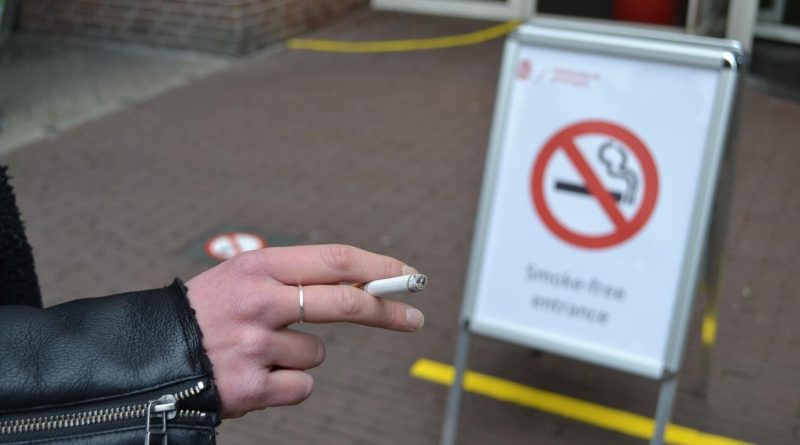Smoke-Free Groningen – Radical Law or Cultural Change?
Groningen is steering towards a smoke-free generation. The government has passed a law banning smoking in public spaces at the end of September, but enforcement is complicated, and opponents need to be convinced.
By Valerie Scholz
“People are here to be cured, but have to walk through toxic smoke instead”
University Medical Center Groningen; it is a freezing but sunny day. On the steps leading to the hospitals’ entrance, doctors in white overalls and patients in winter coats are huddled in groups, chatting and holding their gleaming cigarettes in hands tensed from the cold.
“That’s just not logical”, Erin Straat exclaims, as she is explaining the paradoxical former situation. “People come to a hospital to be cured, but instead they have to walk through the smoke that harms them. More and more people get ill from smoking”. Straat works at the Groningen municipality. She is in charge of coordinating and enforcing the new law in Groningen, which bans smokers from public areas within the city.
Although this law was passed by the council of Groningen on the 26th of September 2018, enforcement and implementation are still ongoing. The law will not be achieved using fines but rather with moral urgency, Straat explains. It is meant to encourage public organizations such as schools, hospitals, and universities to ban smoking not only on, but also close to their premises.
“Everyone is equal, except for smokers and fat people”
Not only smokers oppose the new law. “In our society, health is becoming a question of morality”, Dr. Susanne Täuber says. She is a professor at the University of Groningen and has researched the topic of morality and how norms are moralized in society. Her studies focus on the issue of addictions such as smoking and obesity.
People are categorized according to health and „only ideal-typical citizens are being supported by the government“, she worries. „Everyone is equal. Except for smokers and fat people, they are differently equal“, she adds. While other addicts receive extensive help, smokers are simply banished. “How is that a free democracy?”.
Straat and the municipality of Groningen remain realistic. Their ultimate goal is not to make the city of Groningen entirely smoke-free, but to “achieve a cultural change in smoking habits”.
“It’s a complicated topic”. Straat understands that smokers may feel attacked, as the law forces them to change their habits. The municipality has no intention of making smokers feel worthless, like the “rats of society”.
“Any cultural change takes time and we have to take the time to get there”, says Straat. She compares the current situation with the law in 2008, where smoking was banned from pubs for the first time. “People were furious”, she laughs, “now it seems completely normal to everyone”.
Help the smoker!
Täuber understands that the municipality has only good intentions, but calls for more sensitivity from the municipality’s side. Almost 35.7% of Dutch smokers have tried to quit but often failed. Täuber proposes offering better aid to smokers, such as 5- or 10-year schemes aiming to make quitting easier.
“It is very important to keep listening to the people that feel attacked”. Straat agrees with Täuber, that changes cannot be too radical, it will take time and sensitivity. However, she is confident that with a thorough explanation of the importance for the next generation, the new law will seem reasonable and logical even to people who may at first oppose. “Public health has priority”. Only by changing habits at their roots, can there be a healthy future for children of the coming generations.

